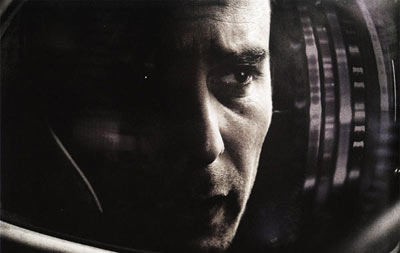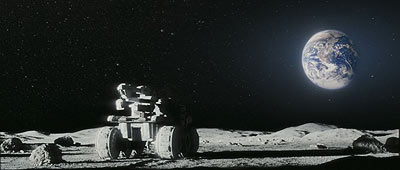Moon: A Glimpse at the Dark Side
Published on September 29th, 2009 in: Current Faves, Halloween, Horror, Issues, Movie Reviews, Movies, Reviews, Science Fiction |By David Speranza
When Star Wars came out in 1977, I was among its more ardent fans, seeing it upwards of ten times before it left theaters. But as the years passed and my tastes matured, it became apparent that the coming of Star Wars had essentially meant the end of thoughtful, adult science fiction in movies.
The previous cycle had begun with 2001: A Space Odyssey in 1968, which was followed by Planet of the Apes, A Clockwork Orange, THX-1138, Silent Running, Soylent Green, Dark Star, and Rollerball, among others. And while further examples of serious science fiction emerged after 1977—the first remake of Invasion of the Body Snatchers (1978), Alien (1979), Blade Runner (1982), even Outland (1981)—by then movie sci-fi, unlike its literary counterpart, had become mostly eye candy, pitting good against evil, flouting the laws of physics, and finding endless ways to blow things up.

While not much has changed in recent years (see Transformers, G.I. Joe, et al), there have been a few encouraging examples of adult sci-fi in this decade, most notably Steven Soderbergh’s reinterpretation of Solaris (2002), Code 46 (2003), Children of Men (2006) and Sunshine (2007). And now there’s Moon, a throwback to ’70s cinema that wears its influences like a Nostromo crew patch. Sneaking into cinemas and produced for a meager $5 million, Moon furthers the argument that a thoughtful script, exceptional acting, and resourceful direction can trump the clanking machinery of $150 million computer-generated blockbusters.
Not that the movie looks at all cheap. Its effects, done mostly in-camera and with old-fashioned models, optical effects, and a sprinkling of CGI, are naturalistic and seamless: you come away with an almost visceral grasp of life on the lunar surface. For all its stark, barren beauty, you can see how being stuck there for years, with nothing but delayed video transmissions from Earth and a talking computer for company, might eventually test your sanity.
Which seems to be the case for astronaut Sam Bell (Sam Rockwell), an engineer approaching the end of a three-year contract harvesting Helium-3, which has become Earth’s primary source of energy. Though eager to get back to his wife and daughter on Earth, Sam hasn’t been feeling well, and he’s begun to see things—odd apparitions that are distracting him from his work. One such phantom causes him to crash his lunar rover while on a repair mission, leaving him stranded and unconscious outside the base.
When he awakens in sickbay under the care of GERTY, the base’s HAL-like computer (voiced by Kevin Spacey), his visions have been replaced by questions, beginning with how he got back inside. But answers are not forthcoming—not until Sam has descended into an existential rabbit hole that includes the disquieting possibility that he may not be as alone as he thought.
To reveal more would spoil the film’s numerous revelations, not the least of which is Rockwell’s knockout performance as Sam. Much like the character actors who became stars in the 1970s—Elliott Gould, Donald Sutherland, George Segal, etc.—Rockwell projects an offhand intelligence and an alertness to each moment’s possibilities that seems less like acting and more like living. The work that went into this multifaceted characterization, both technically and emotionally, must have been daunting, and yet Rockwell, as in so many of his roles, doesn’t make it about technique. He’s simply present, his humanity and humor underlying even the most desperate situations.
Kevin Spacey has less to do, but his GERTY—who expresses emotion with a seemingly endless series of computerized happy faces—manages to straddle a line between sympathetic and creepy that leaves us unsure which way his character will finally turn. The fact that Gerty consciously evokes the HAL-9000 from 2001: A Space Odyssey adds a layer of recognition that’s simultaneously entertaining and unnerving.

This is director Duncan Jones’ first feature, and it’s an auspicious start. Much like Roman Coppola’s wonderful but little-seen CQ, which paid tribute to international ’60s cinema both cheesy and sublime, Moon acknowledges its debt to ’70s sci-fi while bringing its own personality and ideas to the table. And if there are echoes of The Man Who Fell to Earth and David Bowie’s “Space Oddity,” that’s probably no coincidence—Jones is Bowie’s son. He’d probably rather this didn’t obscure his own accomplishments, but if Moon is any indication, it won’t be long before he’s casting shadows of his own.
One Response to “Moon: A Glimpse at the Dark Side”
January 18th, 2010 at 7:10 pm
Very well written, terse (but not eccentric) and now I have to track down this film to view (with CQ) and look forward to a lovely weekend at home.
Time limit is exhausted. Please reload the CAPTCHA.